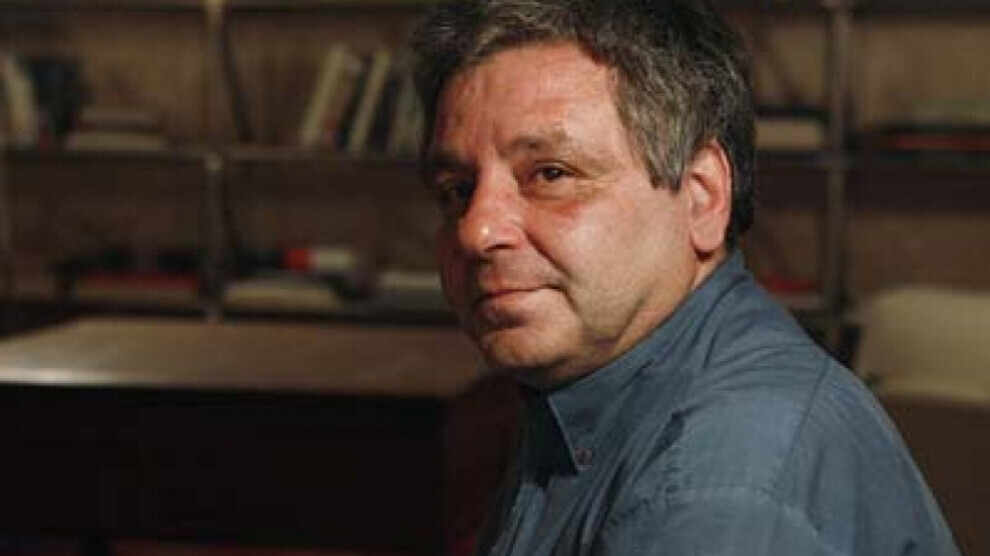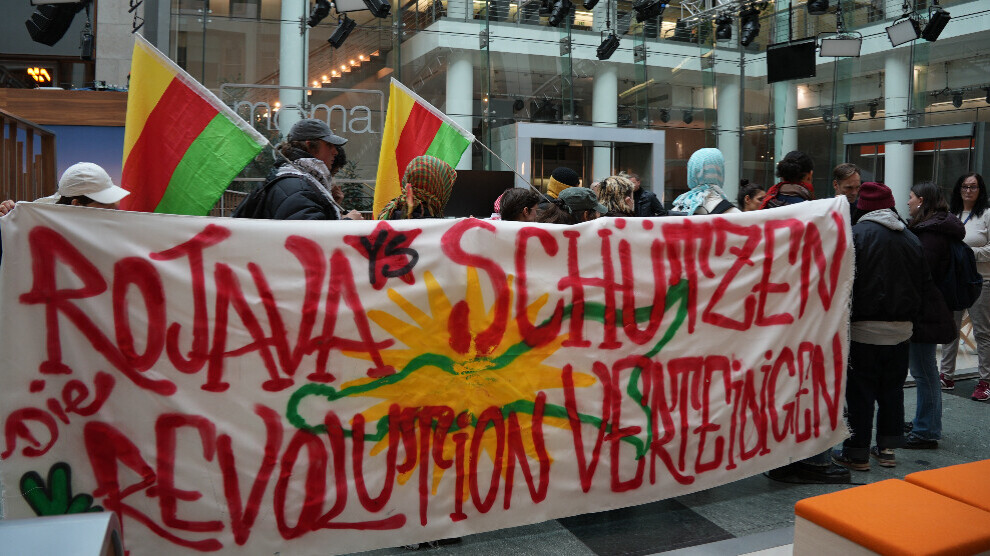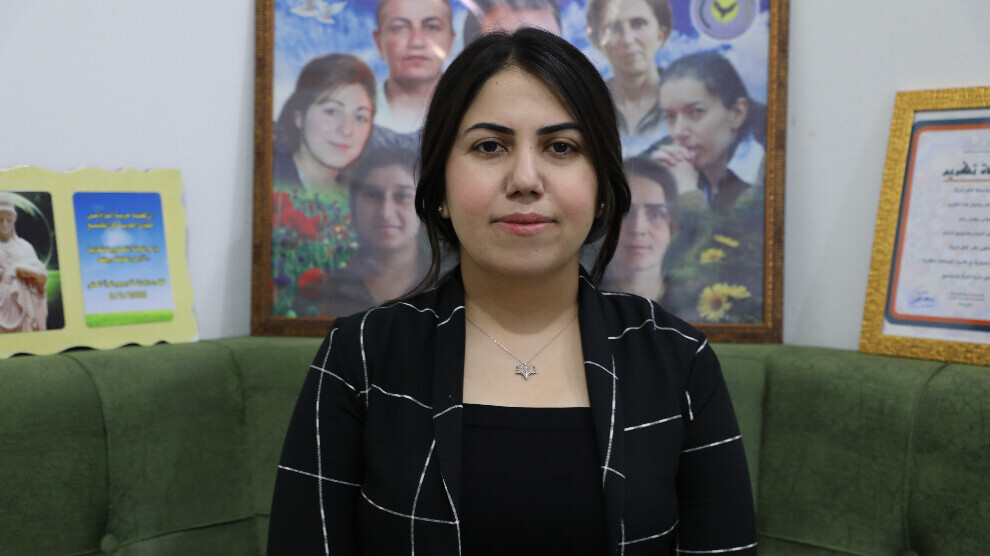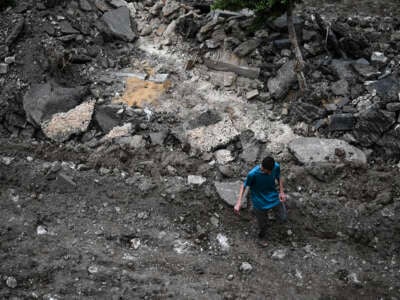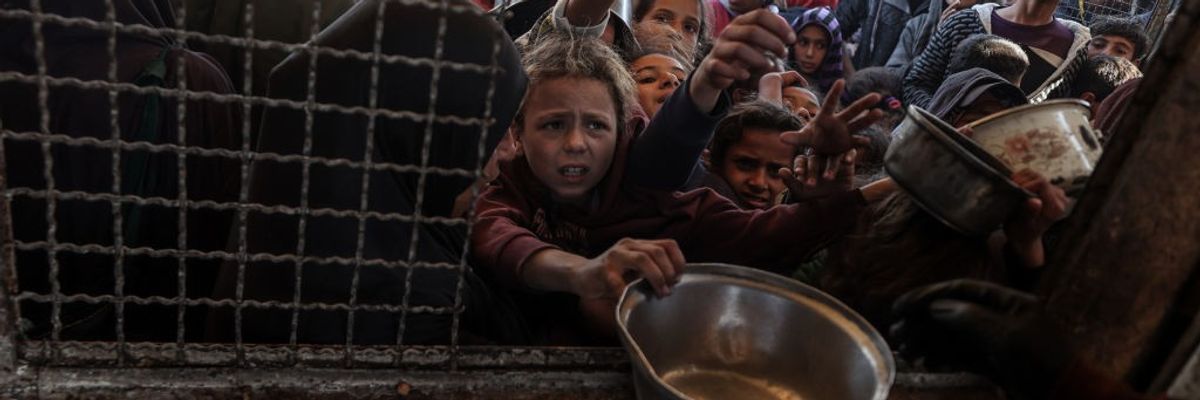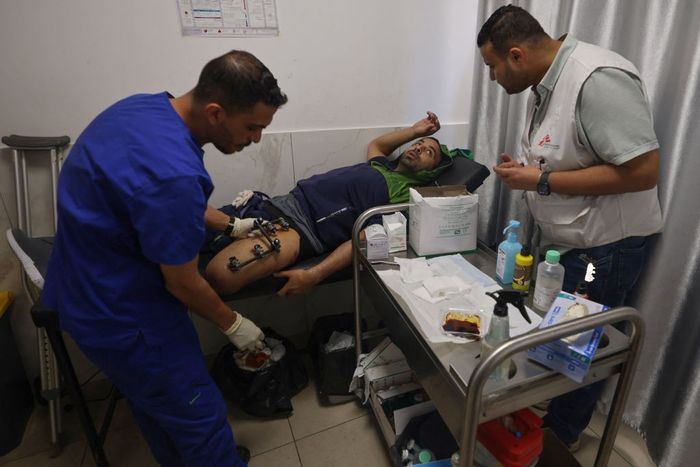Thousands take to the streets in northeast Syria in support of Kurdish-led force
Middle East
Residents in the northeastern Syrian city of Qamishli took to the streets on Thursday in a demonstration supporting the resistance of the Kurdish-led Syrian Democratic Forces (SDF) against the recent attacks by pro-Turkey fighters in the region.
Issued on: 19/12/2024 -
By: NEWS WIRES

Syrian Kurds wave independence-era flags during a demonstration in support of the US-backed, Kurdish-led Syrian Democratic Forces in the northeastern city of Qamishli, on December 19, 2024. © Delil Souleiman, AFP
Thousands of people demonstrated Thursday in northeast Syria in support of a US-backed, Kurdish-led force that for weeks has been pushing back against Turkey-backed fighters, an AFP correspondent said.
The show of support for the Syrian Democratic Forces (SDF) comes after Islamist-led rebels toppled Syria’s longtime strongman Bashar al-Assad earlier this month.
A Turkish defence ministry source said Thursday that Ankara would push ahead with military preparations until Kurdish fighters “disarm”.
Demonstrators in Qamishli for the first time raised the three-starred flag adopted by Syria’s new authorities, symbolic of the uprising against Assad's rule that began in 2011, the correspondent said.
“Long live the SDF resistance,” demonstrators chanted, also yelling, “The Syrian people are one” and “No to war in our region, no to Turkey’s attack” on northeast Syria.
Others raised the flag of northeast Syria’s semi-autonomous Kurdish administration, and of the SDF, which spearheaded the fight that defeated Islamic State group jihadists in Syria in 2019.
Qamishli resident Mazloum Ahmed, 39, said people “came out today to support our forces”.
“We have been on this land for thousands of years,” he said, adding: “We must obtain our rights... in the new Syrian constitution.”
Another demonstrator, Salha Kalash, 50, said “the Syrian people must be one and fight to protect our land”.
“We want a democratic Syria where everyone has their rights... it's time for us to have our place in a Syria of justice and equality”.
On Wednesday, the Syrian Observatory for Human Rights war monitor said 21 pro-Turkey fighters were killed after they attacked a Kurdish-held position near the northern town of Manbij despite a US-brokered ceasefire extension in the area.
Concerns have grown over a possible Turkish assault on the Kurdish-held Syrian border town of Kobane, also known as Ain al-Arab, about 50 kilometres (30 miles) northeast of Manbij.
The SDF on Thursday accused Turkey and allied fighters of “not adhering to the (ceasefire) decision and continuing attacking” south of Kobane, encouraging residents to “take up arms against the (Turkish) occupation”.
Turkey accuses the main component of the SDF, the People's Protection Units (YPG), of being affiliated with Kurdistan Workers’ Party (PKK) militants at home.
Both Washington and Ankara consider the PKK “terrorist” group.
A military chief from Islamist rebel group Hayat Tahrir al-Sham said this week that Kurdish-held areas of Syria would be integrated under the country’s new leadership.
The Kurdish administration has extended a hand to Syria’s new authorities, but fears it could lose its limited self-rule in the northeast.
(AFP)
Turkey won't halt Syria military activity until Kurd fighters 'disarm'
AFP , Thursday 19 Dec 2024 Ahram Online -
Ankara will push ahead with its military preparations until Kurdish fighters "disarm", a defence ministry source said Thursday, stressing Turkey faces an ongoing threat along its border with northern Syria.

File Photo: Turkish-backed Syrian rebel fighters take part in a military exercise in the countryside of Afrin in the rebel-held Aleppo province. AFP

KURDISH YPJ FIGHTER
The comments came as concerns grew over a possible Turkish assault on the Kurdish-held Syrian border town of Kobane, also known as Ain al-Arab, some 50 kilometres (30 miles) northeast of Manbij.
Turkey has thousands of troops in northern Syria and also backs a proxy force there which has engaged in ongoing clashes with the SDF, a US-backed Kurdish-led force that Ankara sees as an extension of its domestic nemesis, the Kurdistan Workers' Party (PKK).
"The threat posed by the terrorist organization to our borders and our operation areas in Syria continues," the source said.
"Until the PKK/YPG terrorist organization disarms and its foreign fighters leave Syria, our preparations and measures will continue within the scope of the fight against terrorism."
Turkey accuses the YPG (the People's Protection Units), which makes up the bulk of the SDF, of being affiliated with the PKK which both Washington and Ankara consider a "terrorist" group.
Since 2016, Ankara has carried out several major operations against the SDF.
But Turkey believes Syria's new rulers and Ankara-backed insugents "will liberate the regions occupied by the terrorist organization PKK/YPG," the ministry source said.
The fighting between Turkish-backed factions and Syrian Kurdish fighers comes more than a week after insugents toppled Syria's longtime strongman Bashar al-Assad.
Washington on Tuesday said it had brokered an extension to a fragile ceasefire in Manbij and was seeking a broader understanding with Turkey.
But the defence ministry source insisted Ankara was not talking with the SDF, saying it was "out of the question for us to meet with any terrorist organization".
State Department spokesman Matthew Miller said Tuesday the Manbij truce had been "extended through the end of the week, and we will, obviously, look to see that ceasefire extended as far as possible into the future".
But the Turkish source said "every step taken by terrorist groups that pose a threat to the security of our country and Syria is followed, and preventive and destructive measures are taken".
Hollande says attacks on Rojava "unacceptable"
Former French President François Hollande said that attacks on Rojava are unacceptable, and added: "I cannot tolerate the abandonment of the Kurds. I am calling on France and the international coalition to protect the Syrian Kurds."
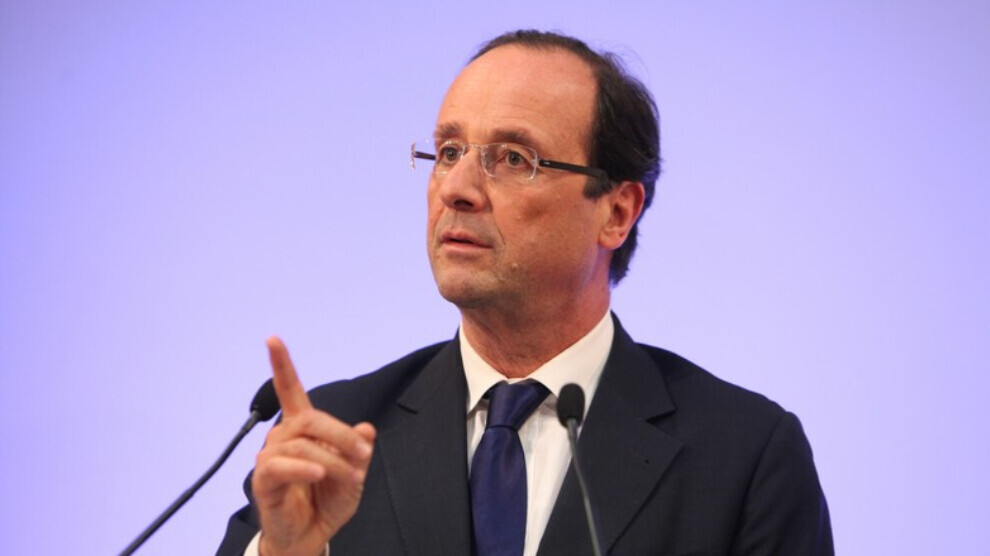
ANF
PARIS
Thursday, 19 December 2024,
International reactions to the attacks by the Turkish state and its affiliated armed groups on areas under the control of the Autonomous Administration of Northern and Eastern Syria (Rojava) continue. Former French President François Hollande, speaking during a live broadcast on Franceinfo to discuss developments in Syria, said that the attacks on Rojava are unacceptable and warned that Europe cannot turn a blind eye to what is happening in the Autonomous Administration regions.
When reminded of European Commission President Ursula von der Leyen's remarks suggesting that the European Union should strengthen its ties with the jihadist group HTS (Hay’at Tahrir al-Sham) and asked whether HTS could be trusted, Hollande responded: "First, they need to provide evidence. Let me issue a warning here: HTS is not the only Islamist group. There are also Turkey-backed groups and other, more democratic groups. We need to see what these groups will do in the areas they control."
‘Kurds helped us against ISIS, they cannot be abandoned’
Hollande continued by highlighting the importance of supporting Syrian Kurds, and said: "There can be no attacks against the Syrian Kurds. It was the Syrian Kurds who helped us in our fight against DAESH (ISIS). Without the Syrian Kurds, it would not have been possible to uproot DAESH from Syria. France provided them with full support. As President, I could not, in good conscience, accept the abandonment of the Syrian Kurds today. Additionally, the Syrian Kurds are currently keeping thousands of DAESH prisoners under control. If these individuals are released, sooner or later they will return to our own territories."
‘Kurds play a crucial role against terrorism’
Hollande called for the protection of the Autonomous Administration of North and East Syria, and said: "The Kurdish autonomy must be respected. What I mean by that is that the Syrian Kurds play an important role. They have been, and continue to be, absolutely vital in the fight against terrorism. However, this does not mean that they must separate from Syria. The message should be that they need to coexist within the region."
‘France and the International Coalition must protect the Kurds’
The former president insisted on France’s responsibility, saying that "France must protect the Kurds. France, along with the International Coalition established to fight terrorism, has a duty to protect them. As for Von der Leyen, Europe cannot ignore what is happening in this part of Syria. While I was in the European Council, I encountered Europeans who viewed Syria as a distant place with no impact on the European continent. But we experienced terrorist attacks, and so did they. Therefore, they need to understand that what happens in Syria can also have repercussions on our own territories."
Ousted Assad regime leaves Syria, economy in ruins
December 18, 2024 Middle East Monitor –

People gather to celebrate with the ‘Syrian revolution flag’ after performing the first Friday prayer following the collapse of the 61-year-long Baath regime in Syria and the end of the Assad family’s rule in Aleppo, Syria on December 13, 2024 [Kasım Rammah – Anadolu Agency]
Syria’s collapsed regime of Bashar Al-Assad left the country and its economy in ruins, turning it into a den for terrorist organisations and illegal activity, Anadolu Agency reports.
The country suffered from displacement and uncountable deaths, while its capital stock and economic activities were plagued by the civil war and international sanctions, as the country’s production, foreign trade and foreign exchange earnings plummeted. Its economic indicators, budget balances and exchange rates have also been destabilised.
Syria’s gross domestic product (GDP) is estimated to have halved in 2010-2020 and the country’s dependence on imported goods soared, including staple food products, and its local industrial and agricultural production collapsed, according to various sources, such as the World Bank, the UN, the International Monetary Fund (IMF) and the World Gold Council.
Syria’s GDP is estimated to have been $37.1 billion in 2022, $39.5 billion in 2023, and $29.3 billion in 2024—a stark difference from $60 billion in 2010, before the civil war.
The country’s GDP per capita declined from $2,800 in 2010 to $2,100 in 2022 and 2023, and it is estimated to fall further towards $1,600 by the end of the year.
READ: Russia dismantles air defence system at Hmeimim air base in Syria
At the same time, the overthrown regime’s revenues fell 35 per cent year-on-year in real terms in 2023 versus 2022, and 85 per cent compared to the pre-civil-war period, before 2010.
Oil production, exports down
Meanwhile, Syria, once the largest oil exporter in the Eastern Mediterranean, lost its key position in oil production and oil exports as a result of the capture of oil-rich regions by non-regime forces. Syria’s oil production of 383,000 barrels per day before the civil war dropped to 90,000 barrels per day last year.
Syria ran a foreign trade deficit of between $7 billion to $10 billion annually from 2007 to 2011 but the country’s foreign trade declined rapidly as the unrest that started in March 2011 grew into a full-blown civil war, which resulted in international sanctions and, consequently, the country’s foreign trade volume fell from $29 billion in 2010 to $4 billion in 2023.
Syria ranked 176th in the world last year, with its exports reaching $650 million, and 163rd in the world with imports totalling $3.4 billion.
The country’s most important exports were olive oil, calcium phosphate, cotton, spices, canned vegetables, cast iron scrap, shelled fruits and wheat, while its imports were sunflower oil, wheat flour, petroleum, animal feed, rice, sugar, cement, tea, electricity and construction iron.
Syria’s rapidly growing population reached 22 million in 1990-2011 and recent estimates show the population stands at 18.5 million.
Meanwhile, the civil war in the country led to serious losses in employment, as the unemployment rate is estimated to have reached 57 per cent.
Depreciating currency, rising inflation
The Syrian pound depreciated 270 times against the US dollar in 2011-2023, which further fuelled inflation, while inflation reached 64 per cent in 2022 and 141 per cent in 2023. Inflation projections show it is estimated to be at 95.1 per cent by the end of this year and 69.4 per cent in 2025.
READ: US officials warn of ‘imminent’ threat of new Turkiye military incursion into Syria
Syria used to be one of the prominent countries in the Middle East in gold and oil reserves, with an estimated gold reserves of 25.8 tons in 2011, and although this figure is estimated to have remained relatively the same after the civil war and the fall of the regime, there is reportedly no reliable data to be found on the country’s foreign exchange reserves.
Meanwhile, the largest oil and gas fields in the country are occupied by the PKK/YPG terrorist organisation. The organisations operating in gas and oil-rich areas, which are concentrated in the north-east, are estimated to have extracted at least 150,000 barrels on a daily basis.
Despite the Caesar Act imposed by the US on Syria, which sanctioned Assad for war crimes against Syrians under the first Trump administration, the PKK/YPG is reported to have sold most of its crude and processed oil to the regime, and its annual income from the oil sold to the Assad regime and Northern Iraq is estimated to have exceeded $1.2 billion.
Prior to the civil war, Syria was one of the most dynamic markets in the Middle East and the steps towards the transition to a free market economy and rising oil reserves triggered rapid growth in the country’s economy, creating business opportunities for foreign firms and investments, as the booming oil and gas industry and infrastructure projects made Syria an attractive market, though the conflict, starting in 2011, put a pause to foreign direct investments.
Syria has 11 safe zones, and in these designated zones, foreigners can establish companies and projects in line with incentives and five-year tax exemptions.
Agriculture badly hit
However, the decline in all sectors of Syria also hit its agriculture, as the cultivated land in the country fell 25 per cent, versus the pre-civil-war period. The World Bank reported that the access of farmers to seeds, fertilisers, fuel and machinery spare parts, which are needed to grow crops, became increasingly more difficult, resulting in diminishing agricultural production.
Syria became a major producer and seller of the highly addictive Captagon drug, a brand name for the prohibited psycho-stimulant fenethylline, reportedly with the influence of the PKK/YPG. The World Bank reported that the drug business is estimated to have yielded a revenue of up to $5.6 billion in 2020-2023, while those involved in the Captagon sales are said to have profited $1.8 billion per year.
GUST ARBITER
Study: 80,000 Syrians work in Germany in professions lacking specialised personnel
December 18, 2024
Middle East Monitor

In response to Al-Jolani’s call, Syrian people take to the streets in celebration in Hanover, Germany, on December 14, 2024 [Somaya Abdelrahman/Anadolu Agency]
The results of a study indicated that the return of Syrian refugees living in Germany to their homeland could negatively affect the German economy and increase the gap in the shortage of skilled workers.
A study issued by the German Economic Institute (IW) showed that about 80,000 Syrians in Germany work in professions that suffer from a shortage of skilled workers.
For example, the number of Syrians working as technicians in the car mechanic sector has recently reached more than 4,000.
The Institute reported that about 7 out of 10 vacant positions in the field of automotive technology cannot be filled with specialists possessing the appropriate qualifications.
Many Syrians also work in other professions that suffer from a shortage of workers. Statistics indicate that about 2,470 Syrians work in the field of dentistry with contracts subject to compulsory social security; 2,260 Syrians work in the field of childcare and education; 2,160 in the field of nursing and health care; 2,100 in climate-related jobs in the field of electrical engineering and 1,570 Syrians work in the field of plumbing, heating and air-conditioning.
Fabian Semsarha, an economist at the IW and author of the study, stated that “Syrian workers are important to the German labour market, as they contribute significantly to alleviating the shortage of specialised personnel in Germany.” The study also indicates that many Syrians work in other professions, such as doctors, with the number of Syrian doctors working in Germany estimated at around 5,300. The study confirmed that their return to their homeland could worsen the shortage of personnel and lead to problems in providing health care.
Semsarha believes that the contribution by Syrian personnel is often underestimated in the debate about the possibility of their return.
“In many professions, it may become difficult to fill positions if these people leave the country,” he said, calling on politicians to provide safe residence opportunities for working Syrians.
According to the Federal Employment Agency, there were an average of 213,500 people of Syrian origin working in jobs covered by social insurance in Germany between June 2023 and May 2024.
Of the total number, 86,000 are employed in support jobs, while 127,000 are employed in skilled jobs that require vocational training or university studies. There are also around 155,000 Syrians who have registered as unemployed, making it possible for them to immediately enter the labour market.
A Christmas miracle in Syria
(RNS) — Assad was the King Herod of our time. Like Herod, he slaughtered the innocent.
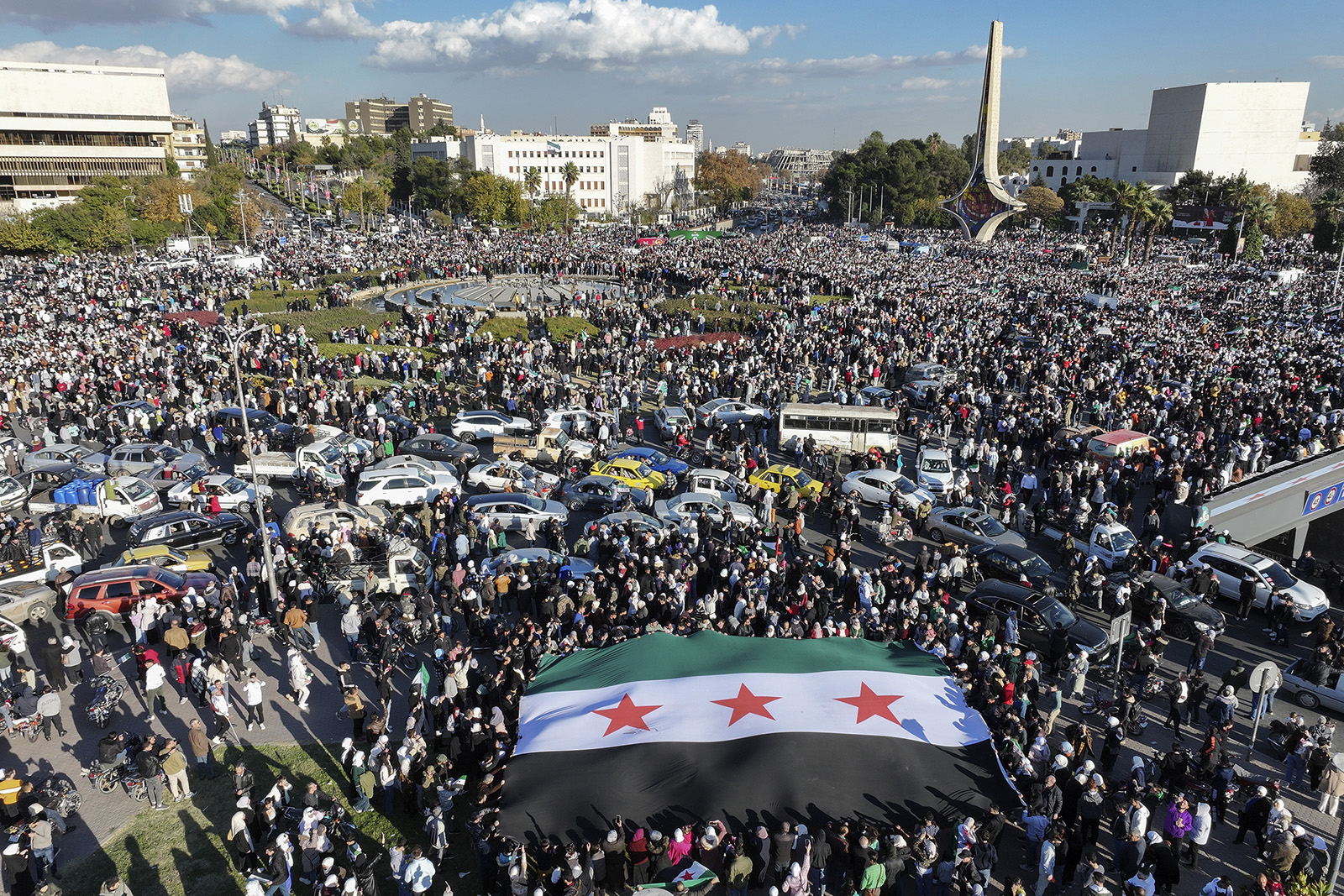
Syrians gather during a celebratory demonstration following the first Friday prayers since Bashar al-Assad's ouster, in Damascus' central square, Syria, Friday, Dec. 13, 2024. (AP Photo/Ghaith Alsayed)
Thomas Reese
December 16, 2024
(RNS) — At a time when most of the international news is full of gloom and doom, the fall of the Assad regime in Syria is a happy surprise, almost a Christmas miracle. Bashar al-Assad, the last scion of the family that ruled Syria for 50 years through fear and terror, is gone.
Assad was a King Herod of our time. He arrested, tortured and killed thousands of Syrians and forced millions more into exile. He used barrel bombs and chemical weapons against his own people. Cities harboring opponents to his regime were leveled with no regard for the cost in civilian deaths, children or adults. Nowhere was safe, not churches, not hospitals. Like Herod, he slaughtered the innocent.
Assad was aided and abetted by Russia, Iran and Hezbollah, Iran’s proxy in Lebanon. The West imposed economic sanctions to try to squeeze him out of power, but in latter years was more concerned about quashing the Islamic State group and al-Qaida than the plight of the Syrian people under Assad. American troops are still in Syria to attack Islamic State group fighters. We also support the Kurds in Syria, who have been one of our most loyal and effective allies.
RELATED: Despair in the Holy Land
Meanwhile, Western intelligence and the media failed to see how weak the Assad regime had become. Its economy was in shambles. Its allies were occupied elsewhere: Russia in Ukraine, Iran and Hezbollah with Israel. Its soldiers were poorly paid and unwilling to die for a regime that did nothing for them. In hindsight, the fault lines were evident.
The fall of Assad has rearranged the Middle Eastern chessboard. Turkey, which backed the rebels, will have more influence in Syria and elsewhere. Russia is confined to a narrow strip on the coast of Syria and may soon have to evacuate the country, where they are not welcome.
Iran has lost its most strategic ally in the Middle East. Without a land route through Syria, Iran cannot resupply Hezbollah, which is already crippled because of its war with Israel. With a severely weakened Hezbollah and Syrian refugees departing for home, the politics of Lebanon will now change. Iraq, too, could be safer if Syria is no longer a safe zone for terrorists.
But all is not well in Syria. Soldiers of its new rulers, Hayat Tahrir al-Sham, have liberated Damascus, Aleppo and Hama, but they do not control the whole country. Numerous rebel groups will compete for dominance, including pockets of al-Qaida and the Islamic State group. Bringing the country together will not be easy.
The more radical groups will not lay down their arms. The Kurds, who opposed Assad, fear the Sunni Arab majority that has now taken over the country. The Assads belonged to a minority Shia sect called the Alawites. They and other minority groups that allied themselves with Assad also now fear for the future.
Hayat Tahrir al-Sham is labeled a terrorist group by the United States and other Western countries. Its leader, Abu Mohammad al-Julani, has a U.S. bounty of $10 million on his head. In the past, he opposed the Islamic State group’s attempts to take over his forces. He was allied with Al-Qaida but broke with the group in 2016. He is focused on Syria not on a global jihad.
According to The New York Times, Hayat Tahrir al-Sham is described as pragmatic and disciplined by those who have studied it or interacted with it in Idlib Province, the territory it controlled in northern Syria prior to the fall of Assad.
So far, al-Julani has said and done all the right things. He has disarmed Syrian soldiers and sent them home. He has told civil servants to stay at their jobs and told his supporters not to take revenge on Assad supporters. All religious and ethnic groups are to be left in peace. Looting will not be tolerated. He has told his soldiers not to hassle women about their clothing.
It is as if he learned from the mistakes the U.S. made after conquering Iraq.
On the other hand, Hayat Tahrir al-Sham has jailed its critics in Idlib. And Facebook and other social media are full of threats against groups allied with Assad, especially the Alawites.
What should the United States and Western governments do in response to the Syrian revolution?
First, it should immediately suspend the $10 million bounty on al-Julani. Nothing could be more disastrous for American foreign policy in the Middle East than an American-backed assassination of the liberator of Syria.
Second, the U.S. should suspend the classification of Hayat Tahrir al-Sham as a terrorist group as long as they do not carry out terrorist activities in the future. It can always be reclassified as a terrorist group in the future if needed.
Third, the United States should welcome the positive words coming out of Damascus and lift economic sanctions if their actions continue to be consistent with what the new rulers are saying. International aid organizations should be allowed to help the Syrian people immediately.
Fourth, we should do all we can to facilitate the safe return of refugees to Syria. Many of these refugees have the skills needed to rebuild Syrian society and its economy.
Most importantly, we should not try to micromanage the future of Syria. We want to ensure the protection of Christians, Kurds and other minority groups, but Syria is unlikely to become a Western-style democracy. We should talk with everyone and be willing to facilitate dialogue but not choose sides.
If Syria maintains peace with its neighbors (including Israel) and rejects global jihad, we should see the new Syria as a potential ally, not an enemy. If it is willing to give up or destroy its chemical weapons, we should be happy to help it root out Al-Qaida and the Islamic State group from Syria with intelligence and logistics, but not boots on the ground.
The new Syria provides hope but no guarantees. It may all go up in flames if internal factions war with each other or the victors take vengeance on the defeated. The United States should do what it can to encourage peace and reconciliation, but should not pour gasoline on the fire by taking sides.





